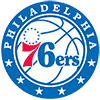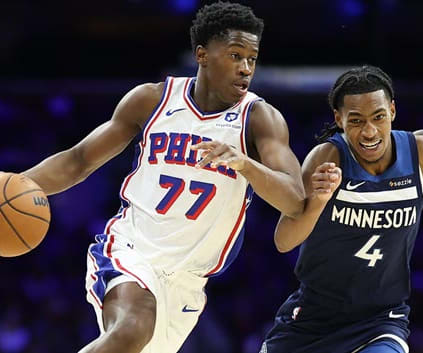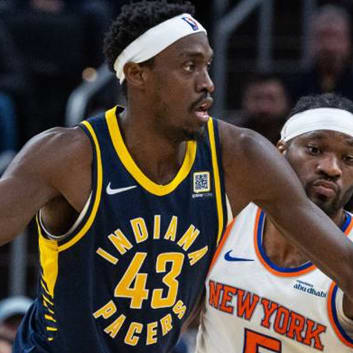Out
Injury Knee
Est. Return 10/28/2025
2025 Stats
PTS
12.0
REB
4.0
AST
3.0
STL
1.0
BLK
0.5
ROS Projections
2025 Fantasy Outlook
Among other things, a lingering left knee injury, which later required surgery, limited Embiid to just 19 appearances last season. He looked far from healthy when he did play, and he arguably produced the worst numbers of his career. It's impossible to discuss Embiid at this point without first caveating the entire conversation with "if he's healthy." Embiid has appeared in just 58 total regular-season games across the past two years and holds an average of 50.2 games played per season, excluding the first two years of his career. The center will also be entering his age-31 season, so youth is no longer on his side. Risk/reward has been the name of the game when drafting Embiid in fantasy, but it's starting to feel much more tilted toward risk. Is there upside for the 76ers to attempt to play him 60 games, or even 30 minutes per game? Keeping him as healthy as possible for the postseason seems like it has to be the priority. Last season in fantasy, he was typically being drafted in the late rounds. Now, he feels like a firm second-round selection, and maybe late second round. He carries more value in shallower, daily moves leagues - especially ones where starting two centers is required. But regardless of league format, managers should probably bolster their roster with another reliable center after drafting Embiid. Read Past Outlooks

Sitting out Monday
Embiid (knee) has been ruled out for Monday's game against the Magic.
ANALYSIS
Embiid will sit out the first leg of the 76ers' back-to-back to manage his left knee, positioning him to potentially return for Tuesday's matchup with the Wizards. In his absence Monday, Adem Bona and Andre Drummond will share duties at center.
Embiid will sit out the first leg of the 76ers' back-to-back to manage his left knee, positioning him to potentially return for Tuesday's matchup with the Wizards. In his absence Monday, Adem Bona and Andre Drummond will share duties at center.
NBA Per Game Stats
Per Game
Total
Per 36
NBA Per Game Stats
Loading Per Game Stats...
2025 NBA Game Log
2025
2024
2023
2022
2021
2020
2019
2018
2017
2016
2025 NBA Per Game Split Stats
Schedule
By Month
Starting/Off Bench
Days Rest
Vs Opp
By Result
2025 NBA Per Game Split Stats
Loading Split Stats...
Advanced Stats
Loading Advanced Stats...
Stat Review
2025
2024
2023
2022
2021
2020
2019
2018
2017
2016
How does Joel Embiid compare to other players?
This section compares his stats with all players from the previous three seasons (minimum 200 minutes played)*. The bar represents the player's percentile rank. For example, if the bar is halfway across, then the player falls into the 50th percentile for that stat and it would be considered average.
True Shooting %
52.0%
Effective Field Goal %
47.5%
3-Point Attempt Rate
50.0%
Free Throw Rate
35.0%
Offensive Rebound %
2.8%
Defensive Rebound %
20.5%
Total Rebound %
11.5%
Assist %
23.7%
Steal %
2.1%
Block %
2.5%
Turnover %
12.0%
Usage %
28.5%
Fantasy Points Per Game
23.8
Fantasy Points Per Minute
1.2
NBA Historical Fantasy Stats
Historical ADP
Loading Historical ADP...
76ers Depth Chart
Our full team depth charts are reserved for RotoWire subscribers.
Subscribe Now
76ers Rotation: Minutes Breakdown
Loading 76ers Rotation Data...
Average Fantasy Points
Minutes
FanDuel
DraftKings
Yahoo
FantasyDraft
Head2Head
Sorare
Average Fantasy Points are determined when Joel Embiid was active vs. non-active during the season. Click here to view average fantasy points for a different time period.
Loading Average Minutes...
Past Fantasy Outlooks
2024
2023
2022
2021
2020
2019
2018
2017
2016
2015
2014
The 2022-23 MVP was off to another great campaign last year before it became derailed by a meniscal flap tear that sidelined him from late January until early April. After two relatively healthy seasons where Embiid played 68 and 66 games respectively, the big man's injury history caught back up to him. The result was 39 regular-season appearances in 2023-24, with averages of 34.7 points on 53/39/88 shooting, 11.0 rebounds, 5.6 assists, 1.7 blocks and 1.2 steals. On a per-game basis, those numbers were good enough to make Embiid the No. 1 producer in eight-category formats. But now the question is on the front of everybody's mind as much as it ever was - how much can we trust Embiid to stay healthy? He's entering his age-30 season as someone who missed the first two years of his career and has never played 70 games in a season. There is no perfect answer in terms of where to draft him in fantasy based on risk/reward, but there's no question he's a first-round talent. The team around him has changed, though. The 76ers effectively replaced Tobias Harris with Paul George - a much higher-usage player, though also one with his own injury woes. How much George takes usage away from Embiid and Tyrese Maxey remains to be seen, and it's possible George ultimately slots in as the third option. Either way, the talent bump should theoretically allow Embiid to play fewer minutes and take more time to rest with the goal of preserving him for the playoffs.
More Fantasy News

Plays 20 minutes Saturday
Embiid finished Saturday's 125-121 victory over the Hornets with 20 points (7-11 FG, 3-6 3Pt, 3-5 FT), two rebounds, four assists and two steals over 20 minutes.
ANALYSIS
Subscribe now to instantly reveal our take on this news.
Subscribe now to instantly reveal our take on this news.

Limited to four points in opener
Embiid was held to four points (1-9 FG, 2-2 FT), six rebounds, two assists and one block in 20 minutes during Wednesday's 117-116 win over Boston.
ANALYSIS
Subscribe now to instantly reveal our take on this news.
Subscribe now to instantly reveal our take on this news.

Will have minutes limit
Head coach Nick Nurse said Embiid will have a minutes restriction during the 76ers' season opener Wednesday, Zack Cox of the Boston Herald reports.
ANALYSIS
Subscribe now to instantly reveal our take on this news.
Subscribe now to instantly reveal our take on this news.

Solid effort in preseason victory
Embiid registered 14 points (5-10 FG, 2-4 3Pt, 2-2 FT), seven rebounds, eight assists and three steals over 19 minutes during Friday's 126-110 preseason win over Minnesota.
ANALYSIS
Subscribe now to instantly reveal our take on this news.
Subscribe now to instantly reveal our take on this news.

Good to go Friday
Embiid (knee) will make his preseason debut Friday against the Timberwolves, according to NBA reporter Chris Haynes.
ANALYSIS
Subscribe now to instantly reveal our take on this news.
Subscribe now to instantly reveal our take on this news.
Latest Fantasy Rumors

Navigating lower workloads
Embiid said Saturday that he's still trying to navigate how to be more effective in limited minutes, Keith Pompey of The Philadelphia Inquirer reports.
ANALYSIS
"Longer stints, you'll actually be able to let the game come to you," Embiid said. "But then again, longer stints also mean you might be done by halftime. But I can't sit for too long... being in shape is one thing, but being in basketball shape is another thing. You need to play, and you need to play a lot." After a dreadful performance on Opening Night, Embiid bounced back against the Hornets on Saturday with 20 points in 20 minutes. However, the 76ers are going to continue bringing him along slowly, and the franchise will hold him out of Monday's game against Orlando due to maintenance.
"Longer stints, you'll actually be able to let the game come to you," Embiid said. "But then again, longer stints also mean you might be done by halftime. But I can't sit for too long... being in shape is one thing, but being in basketball shape is another thing. You need to play, and you need to play a lot." After a dreadful performance on Opening Night, Embiid bounced back against the Hornets on Saturday with 20 points in 20 minutes. However, the 76ers are going to continue bringing him along slowly, and the franchise will hold him out of Monday's game against Orlando due to maintenance.

















